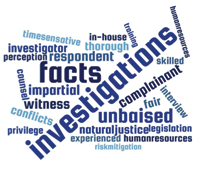
CHEAT SHEET
- A neutral party. Appointing a dedicated internal investigator builds trust and mollifies any concerns of bias or inconsistency.
- Asserting privilege. If investigations are conducted by the Office of the General Counsel, privilege may be asserted.
- Nip risk in the bud. Conducting investigations makes the legal department immediately aware of overall organizational risk.
- Internal measures only. Internal investigators, even if aligned with the legal department, are not defense counsel and ought to be divested if litigation does occur.
Mary, a new hire, recently returned from a business trip to New York City with her senior leader, Jason. It was Mary’s first time to the Big Apple. Jason, who used to live in New York, suggested that when their client meetings conclude they take in the sights. Mary, anxious to please her new boss, but aware of Jason’s reputation as a flirt, reluctantly agreed. After a few drinks at the hotel bar they set off on their tour. After leaving the hotel bar, Mary quickly realized that she would like to call it a night. However, not wanting to disappoint her new boss she went along with the tour. Unfortunately, as they continued to consume more alcoholic beverages, things quickly got out of control. The next morning, although they were scheduled to take the same flight home, Mary quietly arranged to take an earlier flight.
On Monday morning Mary and Jason returned to the office where they both expressed concern to colleagues over what had transpired in New York. Unfortunately there were already rampant rumors circulating…
Although Mary and Jason are fictitious, the scenario is not uncommon in organizations across the globe. Allegations can be serious and reputations placed on the line. Getting to the bottom of the issues and understanding the facts is in the best interest of any organization. That is why workplace investigations are so critical.
There are many elements that must exist for a proper workplace investigation, but it all starts with choosing the right investigator. In this regard, we believe the Office of the General Counsel has a key role to play.
The purpose of a workplace investigation is to fairly and objectively determine the facts. Increasingly, courts and tribunals are scrutinizing not just whether an investigation was undertaken but how it was undertaken with a focus on ensuring that workplace investigations are conducted in a fair and impartial manner in line with the organizational and legislative procedural guidelines. As such, a timely, measured response is imperative. Failure to conduct a proper and independent investigation, or to take complaints seriously, can ultimately undermine the conclusion of the investigation and compromise your organization as well as the employees involved.
There are many elements that must exist for a proper workplace investigation, but it all starts with choosing the right investigator. In this regard, we believe the Office of the General Counsel has a key role to play.
So, how do you choose the right investigator and what have we done?
The role of the investigator
To determine who should investigate, it’s important to remember the investigator’s key role which essentially is to establish the facts in a fair and neutral manner. In order to do that, they need to be properly trained, have knowledge of due process and natural justice, and gain the trust of the parties they are investigating and interviewing. In our experience, it is essential that all parties feel they have been treated fairly throughout the course of an investigation and conclude that they have been provided with a full opportunity to be heard. Parties are more likely to accept the outcome of the investigation (even when it is not their desired outcome) when they believe that they have been treated fairly and the process has been impartial.
Therefore it is crucial that investigators are neutral and remain open minded. Any conflicts, or potential conflicts, need to be reviewed carefully before selecting an investigator. An investigator that has a potential bias, or is perceived to have a potential bias, can ultimately undermine the entire investigation. For example, complainants, respondents, and witnesses may be reluctant to speak to an investigator whom they perceive as being closely aligned to the business, particularly when the business has influence over that person’s career progression or compensation. Depending on how the organization is structured, this can be a challenge when a Human Resources (HR) professional is assigned as an investigator and one of the interested parties is part of the business line that the HR professional serves.
Similarly, an investigator’s prior experience with one of the parties may result in a potential bias (or perception of bias). Being fair and thorough means giving consideration to the evidence as presented, and not relying on historical knowledge. In the example listed in the intro to this article, Jason has an established reputation. Knowing this could certainly bias an investigation, particularly if the investigator is part of his working group. Having a history with either of the parties can lead the investigator to make assumptions about the evidence and make assessing credibility a challenge. The focus of an investigation must be on extracting and considering current, relevant facts and not relying on historical knowledge. And it must be conducted according to policy and procedural rules that may provide guidance on such investigations.
In addition to being impartial, investigators require good judgement, training, and experience. By and large, good judgement is difficult to teach — someone either has it or they don’t, so an organization needs to be sure that whoever is appointed to investigate has these qualities and is properly trained. Experience will come with time, but there is no replacement for good training. Investigations training is critical for those who will be examining workplace complaints. Investigations are complex and can have a lot at stake. Investigators need to be knowledgeable on organizational and legislative procedural guidelines to be able to evaluate evidence, assess relevance, consider credibility, and determine findings. After all, not only do all parties expect this, but litigation or regulatory scrutiny could put the investigation under a microscope.
Finally, the investigator needs to be able to commit the necessary time to doing the investigation properly. Investigations are time consuming. The investigator needs to dedicate the necessary hours to the planning and interviewing process. As the investigation proceeds there will be complications. These can be increasingly challenging for investigators that do not conduct investigations on a regular basis, don’t have the necessary experience, or are unable to commit the needed time due to conflicting demands from their “regular day job.”
Law firms regularly espouse the view that it is best to outsource workplace investigations to legal professionals — legal professionals are trained to look at facts objectively, they are more impartial, and their work is privileged. That may all be true. However, the underlying premise is that they mean external legal professionals. While engaging external counsel may be necessary in some circumstances, we believe that the vast majority of workplace investigations can be investigated fully and properly in-house. After all, the in-house team understands the business and that should lead to a better investigation, if the investigator maintains their impartiality.
Dedicated internal investigator
For many reasons, including cost, number of complaints, and a preference to manage human resources matters internally, an external lawyer doesn’t often make sense. Instead organizations are opting to use a dedicated internal investigator. This approach aligns to the employee’s expectation that their complaint is being considered in a fair and equitable manner and gives the parties validation that their concerns are being taken seriously by their employer.

As noted, investigations are about fact finding. While a dedicated internal investigator has an understanding of the organization’s culture they should not be aligned to a particular business unit. This allows the investigator to relate to the parties but still maintain impartiality.
Dedicated investigators can be perceived as less threatening; as a result people tend to share more during the course of their interviews. In Mary’s case, she has only been at her job for three months and may find the prospect of relaying her experience to external counsel — with whom she has no relationship — daunting. The Office of the General Counsel is not generally associated with the business unit men and women they are investigating. They have no stake or interest in the outcome. They only want the underlying interest of the organization, which is to be open and honest about the issues and get to the bottom them. Ultimately, this lends itself to true fact finding.
At times it may make sense for trained HR professionals to investigate. However, for more complex, sensitive matters that are fraught with risk, or where the respondent is an HR professional or a leader within the organization, such as Jason in our example, a dedicated internal investigator who is an impartial neutral party is the right approach.
Scan of approaches
When we scan current approaches we see organizations that are opting to have different tiers of internal investigators. This may include trained HR professionals for more ‘run of the mill’ investigations and dedicated internal investigators for more sensitive and complex matters. In larger organizations, internal audit may investigate compliance violations while the corporate security department will investigate potential criminal matters.
As workplace legislation continues to evolve globally it is clear that organizational policy, including investigation processes, need to reflect a commitment towards creating a safe workplace which is free from harassment and discrimination and provides for a mechanism to raise, investigate, and address concerns.
As such despite being in-house resources, all investigators need to be trained, skilled, and experienced. In addition, there needs to be clear guidelines and processes in place that those investigators follow in fulfilling their responsibilities.
Where Deloitte landed
We are committed to getting to the truth and this can only be done by conducting fair and objective investigations. In order to do so, all investigations are conducted at the direction of the Office of the General Counsel. All complaints or incidents are channeled through one contact in the Office of the General Counsel — a dedicated internal investigator who acts in conjunction with internal counsel. This person is not a lawyer but instead a trained and experienced HR professional. While having knowledge of the business, she remains independent from it because she is a member of the Office of the General Counsel and is not aligned to a particular business unit. She is experienced, trained, skilled, and most importantly unbiased. As her primary focus is investigations, she is able to dedicate the necessary time to all of the issues involved in each investigation while also keeping abreast of new developments in the area. Given that she is not a lawyer, this is also a financially viable option because the organization does not incur the costs associated with an in-house counsel in this role. Nevertheless, she has access to the lawyers within the Office of the General Counsel and external resources as needed.
In her role as the dedicated internal investigator, she considers all complaints. In conjunction with internal counsel, she decides the best course of action. For straightforward matters such as interpersonal conflict, investigators will be assigned from a small pool of trained HR investigators, who will then report in to her and internal counsel. Where allegations are more serious and/or complex (including allegations of discrimination or harassment), the dedicated internal investigator from the Office of the General Counsel will lead the investigation. In each case, two trained investigators will conduct the investigation; one acting in a lead capacity and the second to ensure a proper record of all interviews is captured.
As part of this process, and in a further effort to maintain consistency and fairness in our process, we have developed a standardized process and templates that are then tailored to each matter. Since the investigation is conducted at the direction of counsel, privilege is asserted throughout.
As with many investigations there are legal hurdles to navigate. In our model, the dedicated internal investigator has access to, and can seek guidance from, both the general and associate general counsel. Additionally, our chief ethics officer is available to provide consultation and advice, where needed.
Once the investigation is complete, the investigator’s role is concluded. Any next steps, including disciplinary action, are considered by human resources in conjunction with internal counsel (who did not play a role in the investigation). All recommendations are implemented by the appropriate HR professionals.
Advantages and disadvantages
There are many advantages to this approach. First of all, it ensures that skilled, trained investigators using standardized, consistent approaches that follow clear internal guidelines conduct all investigations. Secondly, it leads to the development of a center of excellence when it comes to workplace issues — a depth of knowledge on process and substantive issues (including applicable accessibility, human rights, occupational health, and safety regulations) while at the same time ensuring a consistent and fair approach to all investigations. The learnings derived from this approach can then be shared more broadly with our human resources professionals to foster a safe, respectful, and inclusive work environment. Inherently in this process, there is a recognition of the broader principles of natural justice — providing an unbiased forum and fair opportunity for complainants to raise concerns and for respondents to address the allegations. Thus creating confidence in the investigation process and the organization’s commitment to a harassment and discrimination free workplace.
Additionally, this approach allows for consultation with in-house counsel to assist with navigating complicated issues that arise. As investigations are conducted under the direction of the Office of the General Counsel, privilege may also be asserted.
Finally, although each occurrence will have a specific investigation mandate, this approach ensures that there is a broader awareness of overall risk to the organization — understanding that not all complaints are what they seem and the ability to identify and mitigate risk.
However, as with all things, there are potential downsides. Some might argue that any internal investigator, regardless of the source, cannot be objective — because they are part of the organization. Indeed it could be said that even though they are not aligned to a specific business, the Office the General Counsel is still internal and its obligations are to act in the best interest of the organization, thus undermining their impartiality. That said, the interest of the organization is to be open and honest about the issues and therefore committed to learning the facts and acting upon them — a goal that all impacted parties should share.
Although in our model lawyers aren’t always at the front line, it has been suggested that sometimes people don’t trust lawyers. We respectfully disagree. Lawyers are governed by their professional obligations, and we believe that all parties to an investigation and in particular the complainant, see the Office of the General Counsel as an independent and trustworthy confidential place to deal with complaints such as the situation described above.
Although in our model lawyers aren’t always at the front line, it has been suggested that sometimes people don’t trust lawyers. We respectfully disagree.
Litigation or a complaint to a third party such as a human rights office is an unfortunate outcome which can occur, especially if the complaint is not conducted properly. Should an investigation led by the Office of the General Counsel result in litigation we acknowledge that this could pose some issues with respect to representation and defense. As the dedicated internal investigator is not a lawyer, they will be divested from the defense process. And independent counsel, internal or external, will be needed.
Observations and lessons learned
Although it is early days of our new model we are seeing that our theories are being born out. As with all organizations our size, we have dealt with a number of complaints and our people feel like they are being heard. And as we know, the opportunity to be heard is key to any investigation.
Considerations for your organization
Although this model is working for Deloitte, we recognize that for a variety of reasons it may not be the right choice for all organizations. What should you consider when thinking of moving to a dedicated internal investigator approach?
Firstly, do you have experienced and trained in-house professionals that can wear the investigator hat? Investigations are time consuming. Do you have resources that can go the distance when there are complex, risky issues? Do you have individuals who can remain objective and impartial? Those who can investigate senior individuals if need be? Do you have people that can ask the tough questions? Is it someone who can build rapport and make people feel comfortable to share their evidence?
Workplace investigations are complex and time consuming. There can be serious consequences and reputations can be on the line. Getting it right is imperative for all concerned and we believe the Office of the General Counsel has a key role to play in doing just that.
Should an investigation led by the Office of the General Counsel result in litigation we acknowledge that this could pose some issues with respect to representation and defense. As the dedicated internal investigator is not a lawyer, they will be divested from the defense process.






